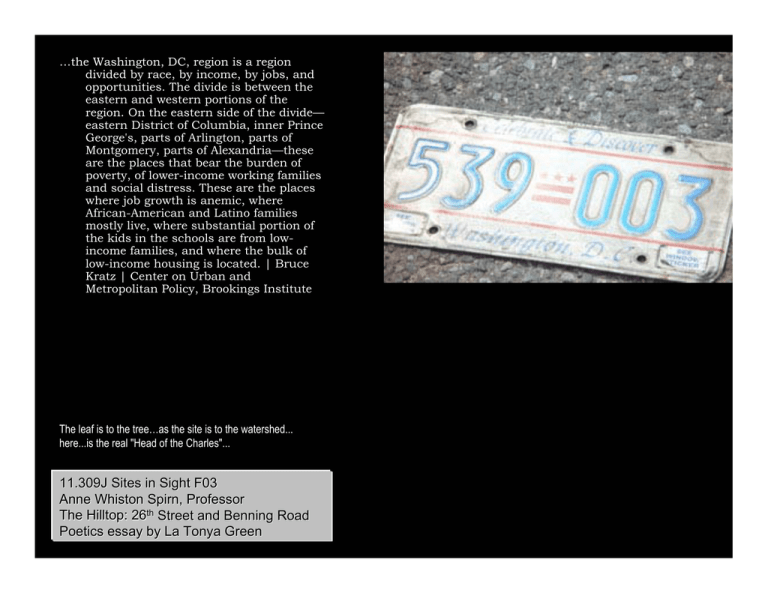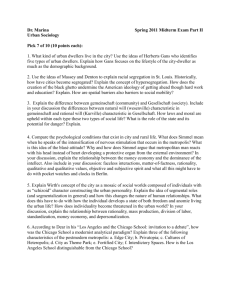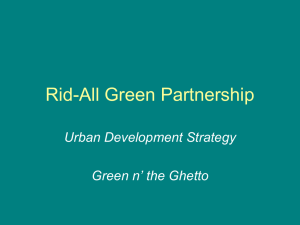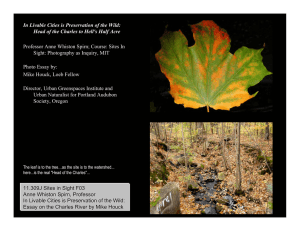…the Washington, DC, region is a region
advertisement

…the Washington, DC, region is a region divided by race, by income, by jobs, and opportunities. The divide is between the eastern and western portions of the region. On the eastern side of the divide— eastern District of Columbia, inner Prince George's, parts of Arlington, parts of Montgomery, parts of Alexandria—these are the places that bear the burden of poverty, of lower-income working families and social distress. These are the places where job growth is anemic, where African-American and Latino families mostly live, where substantial portion of the kids in the schools are from lowincome families, and where the bulk of low-income housing is located. | Bruce Kratz | Center on Urban and Metropolitan Policy, Brookings Institute The leaf is to the tree…as the site is to the watershed... here...is the real "Head of the Charles"... 11.309J Sites in Sight F03 Anne Whiston Spirn, Professor The Hilltop: 26th Street and Benning Road Poetics essay by La Tonya Green ....The first, more recent, tendency is the dilution of the notion of ghetto simply to designate and urban area of widespread and intense poverty, which obfuscates the racial basis and character of this poverty and divests the term of both historical meaning and sociological content. The second, century-old, tenet id the idea that the ghetto is a "disorganized" social formation that can be analyzed wholly in terms of lack and deficiencies (individual or collective) rather than by positively identifying principles that underlie its internal order and govern it specific mode of functioning. The third, flowing from the idea of disorganization, is the tendency to exoticize the ghetto and its residents, that is, to highlight the most extreme and unusual aspects of ghetto life as seen from outside and above, i.e., from the standpoint of the dominant... | Loïc Waquant | Three Pernicious Premises in the Study of the American Ghetto 11.309J Sites in Sight F03 Anne Whiston Spirn, Professor The Hilltop: 26th Street and Benning Road Poetics essay by La Tonya Green The ghetto is ferment, paradox, conflict, dilemma. Yet within its pervasive pathology exists a surprising human resilience. The ghetto is hope, it is despair, it is churches and bars. It is aspiration for change, and it is apathy. It is vibrancy, it is stagnation. It is courage, and it is defeatism. It is cooperation and concern, and it is suspicion, competitiveness, and rejection. It is the surge toward assimilation, and it is alienation and withdrawal within the protective walls of the ghetto. | Kenneth B. Clark | Dark Ghetto 11.309J Sites in Sight F03 Anne Whiston Spirn, Professor The Hilltop: 26th Street and Benning Road Poetics essay by La Tonya Green Even within a single school, the social relationships of different tracks tend to conform to different behavioral norms. Thus in high school, vocational and general tracks emphasize rule-following and close supervision, while college track tends toward a more open atmosphere emphasizing the internalization of norms. | Samuel Bowles and Herbert Gintis | Schooling in Capitalistic America Revisited 11.309J Sites in Sight F03 Anne Whiston Spirn, Professor The Hilltop: 26th Street and Benning Road Poetics essay by La Tonya Green The shift from goods-producing to serviceproducing industries, the increasing polarization of the labor market into lowwage and high-wage sectors, innovations in technology, the relocation of manufacturing industries out of central cities, and periodic recessions have forced up the rate of black joblessness (unemployment and nonparticipation in the labor market)…These problems have been especially evident in the ghetto neighborhoods of large cities, but also because the neighborhoods have become less diversified in a way that has severely worsened the impact of the continuing economic changes. | William Julius Wilson | The Truly Disadvantaged: The Inner City, the Underclass, and Public Policy 11.309J Sites in Sight F03 Anne Whiston Spirn, Professor The Hilltop: 26th Street and Benning Road Poetics essay by La Tonya Green …I think, Paulo, that this whole issue of teaching or educating is a basic one, and that it is definitely connected with what we were talking about earlier: clearly defined political positions in a hierarchical world, in which those who possess power possess knowledge, and present-day society offers teachers a share in knowledge and a share in power….In teaching, questions have been forgotten. Teachers and students alike have forgotten them, and, as I understand it, all knowledge begins from asking questions… | Antonio Faundez in conversation with Paulo Freire | Learning to Question: a Pedagogy of Liberation 11.309J Sites in Sight F03 Anne Whiston Spirn, Professor The Hilltop: 26th Street and Benning Road Poetics essay by La Tonya Green




